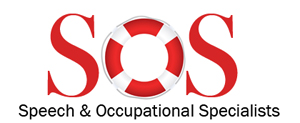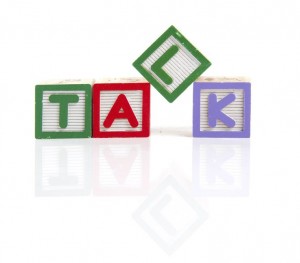Speech Norms
As parents we are always wondering if our children are developing at the level expected for their age. Many of us compare our kids to each other and to other children at the playground just to make sure. While this list is by no means exhaustive, here is a brief overview of the speech, language, feeding and play development expected for young children. If you have any questions or concerns regarding your child’s development in any of these areas, please let us know so that we may evaluate further and provide you with the answers you are seeking.
Birth-6 Months
- Responds to sounds and voices by turning head
- Differentiated cries
- Babbles and coos
- Uses the sounds /p, b, m/ while babbling
- Varies pitch and loudness
- Smiles
- Recognizes nipple, holds bottle
- Opens mouth when spoon is presented
- Reaches for, holds, bangs, and mouths objects
- Enjoys mirror image
6-12 Months
- Responds to name
- Tries to imitate sounds and facial expressions
- Understands words for common items, warnings, and familiar commands
- Babbles and uses jargon with a variety of sound combinations
- Uses 1-3 words meaningfully
- Enjoys music
- Feeds self crackers and cookies, attempts to use spoon
- Drinks from an open cup held by an adult
- Performs many actions on toys including throwing, dropping, putting in containers and taking out of containers
- Looks for toys that are hidden and explores moveable parts of toys
12-18 Months
- Points to desired objects
- Follows simple directions
- Begins to identify body parts
- Imitates new words and uses jargon
- Has a vocabulary of 3-20 words
- Bites through soft foods
- Brings filled spoon to mouth, may turn upside down
- Drinks from a straw, cup with lid, and/or open cup with some spillage
- Discovers the use of toys and plays appropriately with them
- Hands toy to adult for help or to gain attention
18-24 Months
- Speech is 25-50% intelligible to strangers
- Listens to simple stories and new vocabulary
- Follows 2-step directions
- Uses more words than jargon
- Uses 50-100+ words in short phrases
- Begins asking and answering simple questions
- Scoops food onto spoon and self feeds with some spillage
- Drinks from an open cup (no lid) with little spillage
- Combines two toys in pretend play and performs actions on dolls and self
- Creates 2-step play sequences to re-enact familiar activities such as cooking and cleaning
2-3 Years
- The following sounds are mastered: p, d, m, n, w, h
- Speech is 50-75% intelligible to strangers
- Understands most things said to him or her
- Follows directions and answers simple questions
- Expressive vocabulary rapidly develops and is 50-250+ words
- Uses 3-4 word sentences and questions
- Bites through and chews all textures of foods
- Self feeds with spoons, forks and open cups
- Organizes multi-step sequences in play to represent experienced events such as going to the doctor or food shopping
3-4 Years
- The following sounds are mastered: p, b, t, d, k, g, m, n, w, h
- Connected speech is 80% intelligible
- Understands multi-step directions and basic concepts
- Engages in longer conversations
- Uses 800-1,500 words in 4-6 word sentences and questions
- Often asks questions
- Syntax is developing
- Uses language to manipulate, express emotions, for fantasies, joking and teasing
- Uses imaginative pretend play with replica toys such as dollhouses or garages
- Pretends to become a character and uses role play with figurines and puppets
4-5 Years
- The following sounds are mastered: p, b, t, d, k, g, m, n, ng, w, y, h, f
- Speech is fully intelligible to strangers
- Understands and uses basic concepts
- Asks and answers complex questions
- Has a vocabulary of 900-2,000+ words
- Uses grammatically correct sentences up to 8 words in length
- Tells long stories and relays information from school and past events
- Pays attention to a story and answers questions about it
- Plays in small groups and develops friendships
- Enjoys imaginative, fantasy dramatic play and showing off for others
5-6 Years
- All sounds are mastered including: p, b, t, d, k, g, m, n, ng, w, y, h, f, v, s, z, sh, ch, th, j, l, r
- Follows instructions in a group setting
- Exchanges information and uses language in social settings
- Communicates easily with both adults and peers
- Sings entire songs and relays longer stories
- Uses appropriate grammar and detail in sentences
- Answers hypothetical questions
- Reading develops and can answer basic comprehension questions
- Engages in collaborative play with peers, assigning roles and using props to carry out organized sequences of events
- Able to play games by the rules

